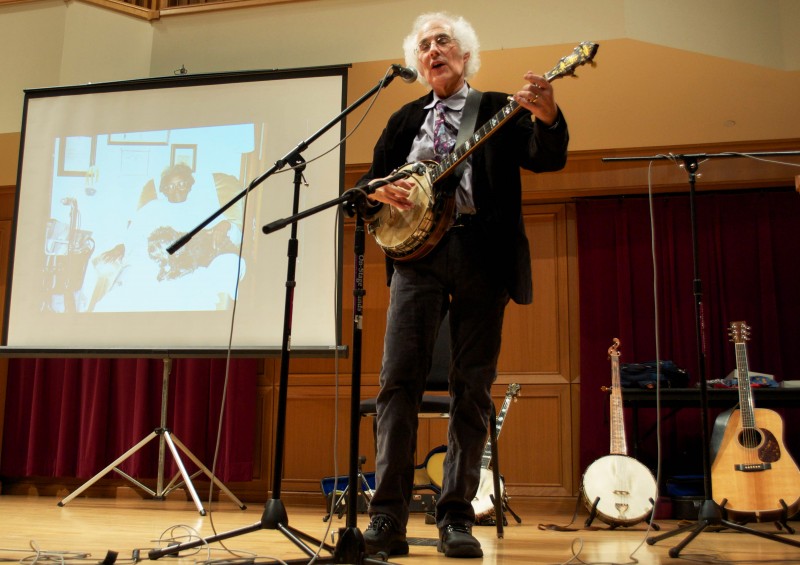
Last Wednesday evening, students, faculty and community members alike gathered inside the Lamont School of Music’s Hamilton Recital Hall to enjoy a free multidimensional performance by American folk musician and scholar Stephen Wade.
Wade’s performance was a unique combination of live banjo playing, accompanied by an enthusiastic verbal narration of a number of stories told in his award-winning book, “The Beautiful Music All Around Us: Field Recordings and the American Experience,” as well as a personalized slideshow of over 600 historical photographs, many of which highlighted those influential, yet largely undocumented American musicians Wade praises in his book.
“Each song takes its own trajectory and each chapter follows its own course,” said Wade. “The story I was telling tonight was the story of how I came to write this book.”
Sarah Morelli, associate professor of Ethnomusicology, was able to bring Wade to DU as part of Lamont’s World Music Concert and Lecture Series, presented by the Expanding Horizons initiative, a project whose mission is to bring a greater diversity of musical traditions to the school and to the Denver community at large.
“He was invited to the University of Colorado at Boulder for a prestigious lecture series,” said Morelli, who was notified via email from CU-Boulder professor and friend Thomas Riis.
“Once I started looking into who he was I became more and more impressed by his accomplishments . . . so we made it happen,” said Morelli.
Wade’s Colorado presence was publicized both around DU’s campus as well as publications like the Westword, bringing a variety of Denver community members to Lamont.
“It was said around the school that ‘a very prolific banjo player is coming,’” said Senior Gabe Rusk, a double-major in Philosophy and Religious Studies, from Denver, “and that’s all I needed to know.”
Though Rusk said he had heard of Stephen Wade before, he didn’t expect to experience a lecture, praising Wade’s educational support alongside his musical performance.
“I thought that amplified the affect to it—that there’s history to a song we’re hearing played . . . it inspires you to associate history with music more, that was my big takeaway from it,” said Rusk.
Denver community member Laurie Hahn, from New Rochelle, N.Y., was also impressed by the educational experience.
“These are precious stories and memories and photographs, and they will die if no one brings them to light, and he’s done that in his book and in his presentation tonight,” said Hahn. “The fact that he’s playing on some of these wonderful old banjos that were from famous people before him . . . that in itself I think is special.”
Wade’s performance was followed by a personalized book-signing reception, complete with appetizers and refreshments for everyone to enjoy.
“I’m in a new section of my life now that this book is out,” said Wade. “Now it’s time to share what I’ve learned with younger people, and that’s what this is really about—this new role in life that the book sort of pivots from.”
Wade made it a point to highlight how art truly is everywhere you find it, a personal mantra he obtained from loyally observing street performer Casey Jones, otherwise known as “the chicken man,” in his hometown of Chicago in the 1950s and 1960s. Wade was only six years old when he first saw the animated Jones playing his accordion, yet his influence inspired him for a lifetime.
Nominated for his album, “Banjo Diary: Lessons From Tradition,” alongside late music icons Janis Joplin, Ray Charles and The Beatles, in the 2013 Grammy Awards’ 64th category of Best Album Notes, Wade has dedicated his entire life’s work to the study of American folklife, teaching lessons of history, music and love to anyone willing to lend an ear.











